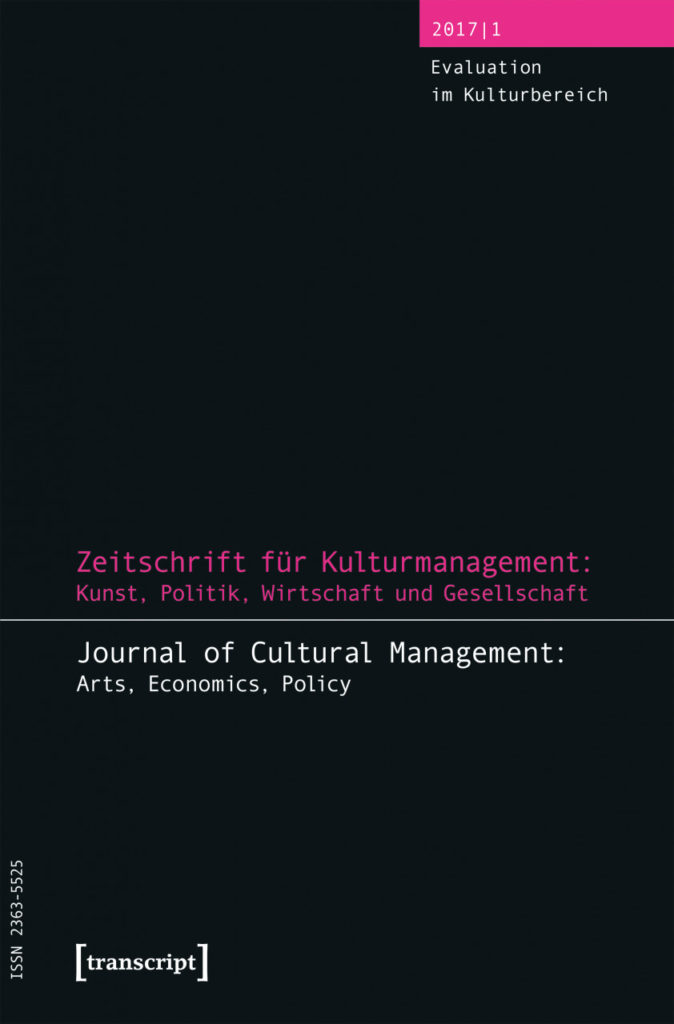Case Study
Evaluation am Theater
Die Kunst, Kultur (nicht nur) zu messen – zu Prozessen und Methoden der Evaluation an Theatern in der südschwedischen Region Skåne
Abstract
Modern society has become an evaluation society. Feedback loops and rating things have become a routine part of our lives. Cultural life has been mostly spared from this obsession with evaluation. However, in a reflective and democratic society, evaluation should and could be useful for the cultural sector as well. For this purpose, evaluations need to recognize the role of art in society as polarizing and complex, and this complexity should be taken into account when carrying out evaluations. This also has an impact on the functions of evaluation in the performing arts.
Based on the evaluation practices of public theaters in southern Sweden between 2006 and 2014, methods, processes and functions of evaluation have been empirically researched and analyzed. The analysis shows that evaluation can have a positive impact if it is not only considered to be an instrument to assess and to control the achievement of objectives, but also to systematically reflect on the quality and effects of theatrical work.
The functions of evaluation in the performing arts are manifold. Evaluation should be seen less as a tool for regulation and more as a tool for conceptual reflection and communication.
Keywords
2017 (1)
Evaluation im Kulturbereich

Related Articles
Theater im Wandel
Vom Krisenmanagement zur ZukunftsfähigkeitYearbook for Culture Management 2011
Research Article
Yearbook for Culture Management 2013
Essay
Kulturmanagement in internationalen und interkulturellen Kontexten
Journal of Cultural Management 2016 (1)
Essay
Journal of Cultural Management 2015 (1)
Research Article
Der Bock als Gärtner
Wenn Kulturmanagement Kulturpolitik ersetztYearbook for Culture Management 2011
Essay
Yearbook for Culture Management 2013
Research Article
© 2026, Journal of Cultural Management and Cultural Policy
Keywords
- Aesthetics
- Higher Education
- Cultural Diplomacy and Foreign Cultural Policy
- Occupation
- Career and Professional Role
- Audience Development
- Audience Studies and Visitor Studies
- Visitor Motivations
- Business
- Covid Pandemic
- Democracy
- Digitalization
- Diversity
- Third Sector
- Empirical Aesthetics
- Development
- Ethics
- Evaluation
- Field Theory
- Festival
- Film
- Federalism
- Community Arts
- Societal Change
- Ideology
- Staging
- Career
- Communication
- Concert
- Creative Industries
- Creativity
- Crisis
- Culture
- arts organizations, cultural organizations
- Cultural Participation
- Cultural Change
- Fincancing The Arts
- Cultural Promotion Law
- Cultural History
- Cultural Management
- Cultural Economy
- Cultural Organizations
- Art Education
- Cultural Policy
- Cultural Production
- Cultural Sociology
- Art Education
- Cultural Understanding
- Arts Administration
- Cultural Industry
- Cultural Sciences
- Art
- Art Field
- Arts Research
- Artists
- Artistic Research
- Artistic Reputation
- Arts Management
- Arts Organizations
- Art education
- Arts Marketing
- Arts Administration
- Curating
- Leadership
- Literature
- Advocacy
- Management
- Marketing
- Market
- Media
- Methods Development
- Mexico
- Monumentalizing
- Museum
- Music
- Non-Visitor Studies
- Opera
- Orchestra
- Organization
- Political Expression
- Post-truth Politics
- Professional Role
- Audience
- Audience Development
- Law
- Government
- Role
- Socially Engaged Art
- Social Cohesion
- Social Change
- Social Cohesion
- Non-visitor Socio-demographics
- Socioculture
- State
- Symbolic capital
- Dance
- Participatory Justice
- Theatre
- Theatre Governance
- Theory Development
- Tourism
- Transformation
- Survey
- Entrepreneurship
- Urbanism
- Civil Society


